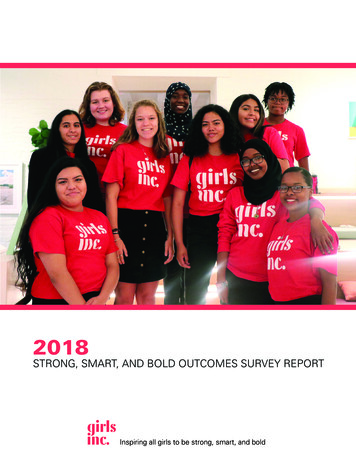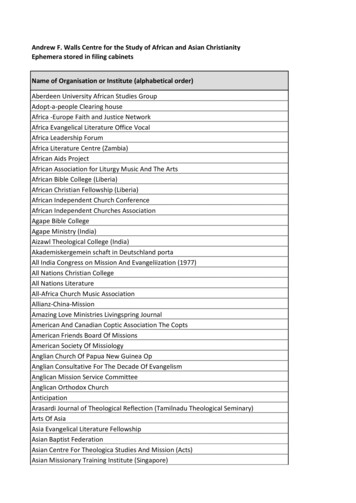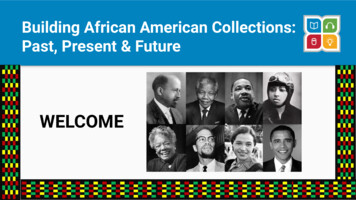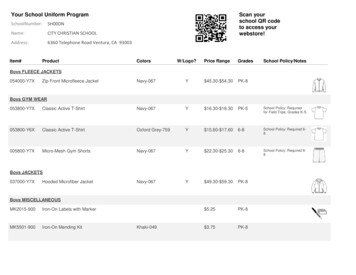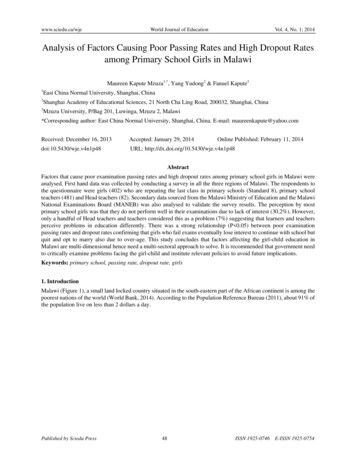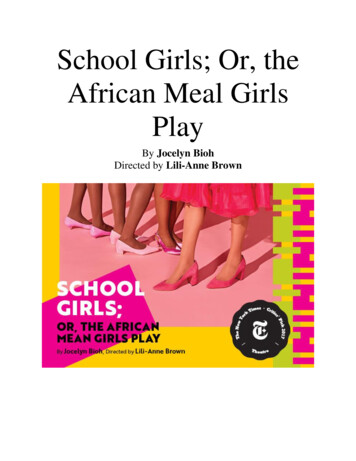
Transcription
School Girls; Or, theAfrican Meal GirlsPlayBy Jocelyn BiohDirected by Lili-Anne Brown
ContentsPage 1 – A Note from Artistic Director Robert FallsPage 3 – Top of Her ClassPage 6 – Skin DeepPage 9 – School Girls; Or, the African Mean Girls PlayPage 14 – Artist ProfilesPage 25 – About Goodman Theatre
welcomeA Note from Artistic Director Robert FallsAccording to an old theater adage, dying is easy, but comedy ishard. Even harder, I believe, is infusing a humorous play withserious, relevant themes without diluting or distorting it. JocelynBioh’s play School Girls; Or, The African Mean Girls Playdelivers laugh-out-loud comedy based on the familiar trope ofthe “mean girl,” who in this case is a Ghanaian high schoolsenior in 1986. But this girl, the queen bee of her small boardingschool, doesn’t know that larger societal forces—racism,colorism and bigotry—can upend her ambitions as quickly asshe squelches those of her classmates. Jocelyn skillfully weavesa story that stylistically nods to the 2004 hit film Mean Girls,but defies its aesthetic origins to pack a thematic punch.Jocelyn, a Ghanaian-American playwright and actor, won aLucille Lortel Award, a John Gassner Award and a Drama Desknomination when School Girls premiered off Broadway at MCCTheater in 2017. The play established her as a vitalcontemporary voice, and I'm thrilled to welcome her to theGoodman for the first time.I also warmly welcome back Lili-Anne Brown, who directed lastyear’s premiere of Ike Holter's Lottery Day, a critical andaudience favorite in our Owen Theatre. I have long consideredLili-Anne an important Chicago artist; in addition to serving asthe Artistic Director of Bailiwick Chicago—where she won aJeff Award for her production of Dessa Rose—her credits1
include work at Jackalope Theatre, American Theater Companyand Firebrand Theatre, among others. Lili-Anne’s precision andsharp sense of timing allows her to adeptly showcase the humorin School Girls, while her passion for social justice enables herto thoughtfully render the characters’ confrontations with racialdiscrimination.I invite you to laugh wholeheartedly at the characters andsituations Jocelyn has created. That laughter need not detractfrom the empathy I hope you will feel for the complex youngwomen depicted on stage. In fact, the humor might open yourheart an extra inch.Robert FallsArtistic Director of Goodman Theatre2
Top of Her ClassLili-Anne Brown isn’t afraid of high school mean girls–ordirecting a big, boisterous play about them either.By Thomas ConnorsFor most of us, success doesn’t come overnight, but it canappear that way to others when good things seem to happen allat once. Take Chicago’s Lili-Anne Brown. She has beenperforming and directing for years, making a name for herselflocally, but these days, her career trajectory is taking off. On topof her laudable credits as Artistic Director of Bailiwick Chicago.She won Joseph Jefferson Awards for her 2019 staging ofCaroline, or Change with Firebrand Theatre and TimelineTheatre Company and her 2018 staging of Buddy: The BuddyHolly Story at American Blues Theater. Just last year, shehelmed two much-lauded productions: The Color Purple atDrury Lane Theatre and the world premiere of Ike Holter’sLottery Day at Goodman Theatre. Now, she returns to theGoodman to direct the Chicago premiere of Jocelyn Bioh’sSchool Girls; Or, The African Mean Girls Play.“I started my directing career in summer stock, so I work veryfast, but stay loose and ready for Plan Z,” says Brown, offering aglimpse of her work ethic. “I came into my own in storefronttheaters, so I have my eye on the budget, no matter where I amnow. I abhor wasting resources.” As for engaging withperformers, she notes that she spent 15 years as a professionalactor, adding “I know what actors go through. So my prime3
directive is simply, 'how I can help them get out of their ownway?' That's all they really need me for.”Brown started out in musical theater and comedy, genres shestill holds dear. “I will find the absurdity in even the mostserious piece,” she says. “I will bring out the music and rhythmand high theatricality in a straight play. If you want a hyper-real,grimy kitchen sink drama, I am probably not your girl. I wouldwant that kitchen sink to run with blood or glitter.”School Girls is set in a Ghanaian high school in the 1980s andrevolves around that volatile mix of envy, ambition andadmiration that rules the lives of young people, especially youngwomen. Looking back at her own years at St. Ignatius CollegePrep, Brown says, “I may have had some inadvertent mean girlmoments early on. I was bullied in elementary school and I wasanxious to reinvent myself as cool in high school–but by senioryear, I pulled a Jerry Maguire in my bougie social group oversome mean girl stuff that was happening. It sucked. I lost myfriend group that I'd been with all four years, and I didn't get todo any of the fun graduation or prom stuff, all because I stoodup for someone who was being slandered—who I think stillended up hanging out with these girls anyway. That's highschool!”As her career continues to pick up speed, Brown exudes theenthusiasm of an artist for whom passion is everything and thefuture is rich with possibility. “At the end of the day, all this isin service to the why why this story, why now, why this way?”she says. “I think any ‘you're in the big leagues now’ nerves aregone. It feels like coming home to return to the Goodman.”4
Thomas Connors is a Chicago-based freelance writer and theChicago Editor of Playbill.5
Skin DeepA Brief History of Race and the Beauty PageantBy Neena ArndtIn School Girls; Or, The African Mean Girls Play, the teenagecharacters pine to win the Miss Global Universe Pageant,1986. In the midst of their youth and enthusiasm, theseGhanaian young women aren’t yet aware that they are enteringinto a system rigged against them. The beauty pageant, as weknow it, was born out of the idea that being beautiful requiredwhite skin.The first Miss America contest–billed as a “bathing beauty”competition–was held on the beaches of Atlantic City inSeptember 1921. Though 19th century festivals, including MayDay and Mardi Gras celebrations, had often featured thecrowning of a “queen,” the standalone beauty pageant emergedas American women gained more access to the public sphere,including the right to vote, and the Victorian constraints arounddecorum and sexuality began to relax (whether the pageantembraced that newfound independence or aimed to preserveVictorian ideals of femininity is up for debate). What is certainis that the pageant’s organizers aimed to celebrate and idealizeonly white women. All eight of the bathing beauties who gracedthe beach in 1921 were white; 16-year-old Margaret Gormanwon the competition and was praised for her sweetness, shortstature and flowing tresses. Two years later, in 1923, AfricanAmerican women made their first appearance in the event—butnot as competitors. Instead, they played “slaves” in a musical6
number. For nearly half a century, the pageant’s bylawsrestricted participation to “members of the white race,” and untilthe 1940s entrants were required to catalogue their genealogy.As the century progressed and beauty pageants gainedpopularity worldwide, women of color found success inpageants outside of America, though international pageants stillfavored women with light skin. It was not until after the CivilRights Movement that a black woman competed in the MissAmerica Pageant, and not until 1983 that a black woman won.That woman, Vanessa Williams (who would eventually bestripped of her title after Penthouse published nude photos of herwithout her permission) later spoke of the many reactions to hervictory. “There were a lot of people,” she noted in 2010, “thatdid not want me to be representative of the United States andMiss America.”In 1989, six years after Williams’ win, black journalist Monte R.Young wrote in the Chicago Tribune about his complexinterpretations of watching a mixed-race woman represent blackAmericans. “It had to do with her cat-green eyes, and thegolden-brown shoulder-length hair flowing in waves over herlight mocha skin,” he writes. “It had to do with the way shelooked. With the white man’s stereotype of black beauty.” Hegoes on to note that when Williams nailed the talent portion ofthe competition, it was with her rendition of “Happy Days AreHere Again,” in which she “sounded more like BarbaraStreisand than Aretha Franklin.” Even when a black womanwon, Young implies, she did so because of her proximity towhiteness.7
As for the current state of the crown, just last year, the fourUnited States-based pageants (Miss America, Miss USA, MissTeen USA and Miss Universe) were all won by black womenfor the first time ever. The current reigning Miss Universe,Zozibini Tunzi, is a black South African woman. In reflecting onher win, Tunzi said, “may every little girl who witnessed thismoment forever believe in the power of her dreams and maythey see their faces reflected in mine.”The young characters in School Girls, coming of age in Ghanain the 1980s, long to grow into their own power and beauty. Butwhat or who has the power to define beauty?Neena Arndt is the Resident Dramaturg at Goodman Theatre.8
Goodman TheatreRobert Falls, Artistic DirectorRoche Schulfer, Executive DirectorPresentsSchool Girls;Or, the African Mean GirlsPlayByJocelyn BiohDirected byLili-Anne BrownSet Design byYu ShibagakiCostume Design bySamantha C. Jones9
Lighting Design byJason LynchSound Design byJustin EllingtonCasting byAdam Belcuore, CSALauren Port, CSADramaturgy byFatima SoweProduction Stage ManagerAlden Vasquez*Stage ManagerKimberly Ann McCann*World Premiere at the MCC Theater, October 16, 2017(Robert LuPone, BernardTelsey & William Cantler, Artistic Directors; Blake West, Executive Director)10
Originally developed as part of The New Black Fest at The Lark, 2016Additional development as part of the MCC Theater PlayLabs series, 2016“The Greatest Love Of All” By Linda Creed and Michael MasserUsed byPermission of EMI Gold Horizon Music Corporation; EMI Golden Torch MusicCorporation. All rights reserved.JPMORGAN CHASE & COMajor Corporate SponsorITW PWC LLPCorporate Sponsor Partners11
School Girls;Or, the African Mean GirlsPlayCastGifty.Adia AlliAma.Katherine Lee Bourné*Ericka Boafo.Kyrie Courter*Nana.Ashley CrowePaulina Sarpong.Ciera Dawn*Mercy.Tiffany Renee Johnson*Headmistress Francis.Tania Richard*Eloise Amponsah.Lanise Antoine Shelley*Assistant Director.Am’Ber MontgomeryVoice and Dialect Coach. Phyllis GriffinDance Consultant.Cheretta HillSCHOOL GIRLS; OR, THE AFRICAN MEAN GIRLS PLAY is presented by specialarrangement with Dramatists Play Service, Inc., New York.Understudies never substitute for a listed player unless an announcement is made atthe beginning of the play.12
Rory Furey-King–Ericka Boafo; Maya Prentiss–Mercy/Gifty/Nana; Adhana Reid–PaulinaSarpong/Ama; Shariba Rivers–Headmistress Francis/Eloise AmponsahThe video and/or audio recording of this performance by any means whatsoever arestrictly prohibited.Goodman productions are made possible in part by the Illinois Arts Council, a stateagency.Goodman Theatre is a constituent of the Theatre Communications Group, Inc., thenational service organization of nonprofit theaters; the League of Resident Theatres; theIllinois Arts Alliance and the American Arts Alliance; the League of Chicago Theatres;and the Illinois Theatre Association.Goodman Theatre operates under agreements between the League of ResidentTheatres and Actors’ Equity Association, the union of professional actors and stagemanagers in the United States; the Society of Stage Directorsand Choreographers, Inc.,an independent national labor union; the United Scenic Artists of America, Local 829,AFL-CIO and the Chicago Federation of Musicians, Local No. 10-208, AmericanFederation of Musicians. House crewand scene shop employees are represented by theInternational Alliance of Theatrical Stage Employees, Local No. 2.*Denotes member of Actors’ Equity Association, the union of professional actors andstage managers in the United States.13
profilesADIA ALLI (Gifty) returns to the Goodman where previouscredits include The Wolves (Assistant Director). Chicago creditsinclude: The Niceties (Writers Theatre); United Flight 232 (TheHouse Theatre of Chicago); Cardboard Piano (TimeLineTheatre); The Escape (Art Institute of Chicago); No Child.(Definition Theatre); Curves and Edges (Interrobang TheatreProject); The Doppelgänger (Steppenwolf Theatre Company);Insurrection: Holding History (Stage Left Theatre); Sweet(Fleetwood-Jourdain Theatre); First (For Youth Inquiry).TV/Film: Seeds! A Nigerian-born, Michigan-raised artist, Adiaholds a BA in theatre, a specialization in African American andAfrican studies and a minor in economics from Michigan StateUniversity. She is represented by Gray Talent Group.KATHERINE LEE BOURNÉ* (Ama) makes her GoodmanTheatre debut. Chicago credits include Beauty and the Beast,Newsies (Paramount Theatre); Mamma Mia!, A Christmas Carol(Drury Lane Theatre); Heartbreak Hotel (BIC BroadwayPlayhouse); Marie Christine (BoHo Theatre); New Faces SingBroadway 1959 (Porchlight Music Theatre); Songs for a NewWorld (Blank Theatre Company). @katherineleebourneKYRIE COURTER* (Ericka Boafo) makes her GoodmanTheatre debut. Chicago credits include Next to Normal (WritersTheatre, Jeff nomination for Performer in a Supporting Role);Marie Christine (BoHo Theatre, Jeff nomination for Performerin a Principal Role); Legally Blonde (Paramount Theatre);Seussical, The Color Purple (Drury Lane Theatre); Company14
(Venus Cabaret Theater); BLKS (Steppenwolf TheatreCompany); Thaddeus and Slocum (Lookingglass TheatreCompany); Dreamgirls, Applause, Babes in Arms (PorchlightMusic Theatre). She is represented by Stewart Talent.@kyriecourterASHLEY CROWE (Nana) makes her Goodman Theatre debut.Chicago credits include Sugar in Our Wounds (First FloorTheater); truth and reconciliation (Sideshow Theatre Company,Jeff nominated); The Veil (Idle Muse Theatre Company); Speedof Light (Otherworld Theatre Company); fml: how CarsonMcCullers saved my life (Loyola University Chicago).Television credits include Chicago PD. Ashley is a graduate ofLoyola University Chicago and is represented by Big MouthTalent.CIERA DAWN* (Paulina Sarpong) makes her GoodmanTheatre debut. Chicago credits include: A Man of No Importance(Pride Films and Plays); We Are Proud ToPresent (Steppenwolf Theatre); The Mutilated (A Red OrchidTheatre); Next to Normal (BoHo Theatre); Jesus ChristSuperstar, The Little Mermaid (Paramount Theatre);Madagascar (Chicago Shakespeare Theater); Other ThanHonorable (American Blues Theater). Film & TV credits:Chicago Fire and Pitch Perfect. Education: Emerson College,Theatre Performance and The School at Steppenwolf.cieradawn.com @thisiscieradawnTIFFANY RENEE JOHNSON* (Mercy) makes her GoodmanTheatre debut. Chicago credits include: A Doll’s House, MaRainey’s Black Bottom (Writers Theatre); Flyin’ West(American Blues Theater); Red Velvet (Chicago Shakespeare15
Theater); Saint Joan (Poetic Forum Collective); truth andreconciliation (Sideshow Theatre Company); VANYA (or,“That’s Life!”) (Rasaka Theatre Company); Hairspray (DruryLane Theatre); The Nativity (Congo Square Theatre). Regional:Race (Next Act Theatre). Television: Shameless, Soundtrack,Chicago Med, Chicago P.D., Chicago Fire, APB and Embeds. AChicago native and Howard University alumna, Tiffany isrepresented by Gray Talent Group. TiffanyReneeJohnson.com @TiffanyReneeJTANIA RICHARD* (Headmistress Francis) returns to theGoodman, where previous credits include A Christmas Caroland By the Music of the Spheres. Chicago: This (Windy CityPlayhouse); Everyman, Nomathemba (Steppenwolf Theatre);Iphigenia at Aulis (Court Theatre); Old Wine in New Bottles,Slaughterhouse 5, Cattle 0, Brother, Can You Spare SomeChange? and Studs Terkel Is Not Working (The Second City);Truth Be Told (Fleetwood-Jourdain); Voyeurs de Venus(Chicago Dramatists); The People’s Temple (American TheaterCompany). Broadway: The Song of Jacob Zulu. Regional: Bluesfor an Alabama Sky, Valley Song (Portland Center Stage);Nomathemba (The Kennedy Center). Film/TV: Work inProgress, NeXt, Chicago Fire, Chicago PD, Chicago Justice,Empire and The Chi.LANISE ANTOINE SHELLEY* (Eloise Amponsah) returnsto the Goodman, where previous credits include An Enemy ofthe People and Stop.Reset. Chicago: Familiar (SteppenwolfTheatre) and work with Lookingglass Theatre, ChicagoShakespeare Theater, Victory Gardens and BackroomShakespeare. Regional: Glass Menagerie, Gem of the Ocean,King Lear, Intimate Apparel, Sueño, Young Lady From16
Rwanda, The Crucible (Milwaukee Repertory Theatre) and workwith American Repertory Theatre, Indiana Repertory Theater,Book-It Repertory Theater, Seattle Repertory Theater, Outsidethe Wire, Shakespeare Santa Cruz, Kansas City Rep.International: Macbeth, All My Sons, Aeneid (Stratford Festival);Nutcracker Turbo (Moscow Art Theatre). TV/Film: ChicagoFire, Chicago Med, The Inner Room, Discovery World andMacbeth HD. She was the Stratford Shakespeare Festival's 2016Chicago Fellow and she received her MFA from ART/MXAT atHarvard University.JOCELYN BIOH (Playwright) is a Ghanaian-American writerand performer from New York City. Bioh’s plays include SchoolGirls; Or, The African Mean Girls Play (2016 Kilroys List,MCC Theater, Center Theatre Group); The Ladykiller’s LoveStory, Happiness and Joe, Nollywood Dreams (2015 KilroysList, Cherry Lane Mentor Project) and African Americans (2011Southern Rep Ruby Prize finalist, 2012 O’Neill Center semifinalist, Howard University). Bioh’s acting credits include workon Broadway as well as productions with Soho Rep, The PublicTheater, Playwrights Horizons, Classical Theater of Harlem,Wilma Theater and Signature Theater. Television writing creditsinclude She’s Gotta Have It and Russian Doll.LILI-ANNE BROWN (Director) returns to the Goodman,where she recently directed Lottery Day by Ike Holter. A nativeChicagoan, Brown works as a director, actor and educator, andhas performed in, directed and produced many award-winningshows, both local and regional. She is the former ArtisticDirector of Bailiwick Chicago, where she focused programmingon Chicago-premiere musicals and new play development withresident playwrights. Recent credits include The Color Purple17
(Drury Lane Theatre) and Put Your House in Order (La JollaPlayhouse). She is a member of SDC, AEA, and SAG-AFTRA,is a graduate of Northwestern University and is represented byWilliam Morris Endeavor.YU SHIBAGAKI (Scenic Design) is a Chicago and NYC basedset designer, born and raised in Japan. Recent Chicago creditsinclude The Brothers Size (Steppenwolf Theatre Company); X(Sideshow Theatre); Cambodian Rock Band, Fun Home(Victory Gardens Theater); Witch, Vietgone (Writers Theatre);Mansfield Park (Northlight Theatre); The Father (RemyBumppo Theatre) and more. Regional credits includeCambodian Rock Band (Merrimack Repertory Theater, CityTheatre Company); Pride and Prejudice (Heritage TheaterFestival); Engaging Shaw, Maids, The Island, The Year ofMagical Thinking (American Players Theatre).SAMANTHA C. JONES (Costume Designer) returns toGoodman Theatre where previous credits include Lottery Day.Chicago credits include work with Court Theatre, VictoryGardens Theater, Steppenwolf Theatre, Northlight Theatre,Drury Lane Theatre, Writers Theatre, Lookingglass TheatreCompany, Chicago Children’s Theatre, American BluesTheater, TimeLine Theatre Company, Porchlight Music Theatre,Jackalope Theatre and others. Regional credits include workwith Kansas City Rep, The Alley, Seattle Children’s Theatre,First Stage Theatre, Skylight Music Theatre, Indiana RepertoryTheatre, Peninsula Players Theatre and others. Upcomingproductions include King James (Steppenwolf Theatre) andBlack Odyssey (Oregon Shakespeare Festival).SamanthaCJones.com18
JASON LYNCH (Lighting Designer) returns to the Goodman,where recent credits include Lottery Day, How to CatchCreation and An Enemy of the People. Additional Chicagocredits include work with Northlight Theatre, Victory GardensTheater, Chicago Shakespeare Theater, Steppenwolf TheatreCompany, among others. Regional credits include work withAlley Theatre, Dallas Theater Center, Denver Center for thePerforming Arts, The Repertory Theatre of St. Louis andOregon Shakespeare Festival. He is also the recipient of the2019 Michael Maggio Emerging Designer Award whichrecognizes emerging theatrical designers within the Chicagoarea. Jason is a proud member of The Association of LightingDesigners.JUSTIN ELLINGTON (Sound Designer) returns to GoodmanTheatre where he previously served as composer and sounddesigner for Father Comes Home from the Wars (Parts 1, 2 & 3)and Until The Flood. Justin also provided original music forHow to Catch Creation. Additional Chicago credits: Familiar(Steppenwolf Theatre Company). Broadway credits: OtherDesert Cities. Off-Broadway credits: Heroes of the FourthTurning (Playwrights Horizons); The House That Will NotStand; Fetch Clay Make Man (New York Theatre Workshop);The Rolling Stone, Pipeline, Pass Over, Other Desert Cities(Lincoln Center); He Brought Her Heart Back in a Box, TheWinter’s Tale (Theater for a New Audience).FATIMA SOWE (Dramaturg) makes her Goodman Theatredebut. Past dramaturgy work includes Caroline, or Change(Firebrand Theatre in partnership with TimeLine Theatre);Assistant Dramaturg for Paradise Blue (TimeLine Theatre) andScottsboro Boys (Porchlight Music Theatre). Additional Chicago19
credits include Movement Choreographer for Cardboard Piano(TimeLine Theatre); Assistant Director for Rutherford and Son(TimeLine Theatre); Assistant Director for True West and TheCurious Incident of the Dog in the Night Time (SteppenwolfTheatre Company).ALDEN VASQUEZ* (Production Stage Manager) has stagemanaged over 85 productions at Goodman Theatre, including 29productions of A Christmas Carol. His Chicago credits include14 productions at Steppenwolf Theatre Company, including theBroadway productions of The Song of Jacob Zulu (also in Perth,Australia) and The Rise and Fall of Little Voice. His regionaltheater credits include productions at American TheaterCompany, American Stage Theatre Company, Arizona TheatreCompany, Ford’s Theatre, Madison Repertory Theatre,Manhattan Theatre Club, Northlight Theatre, Peninsula PlayersTheatre, Remains Theatre, Royal George Theatre, Teatro Vista,Trinity Repertory Company and the Weston Playhouse TheatreCompany. He teaches stage management at DePaul University,is a 35-year member of Actors’ Equity Association and a U.S.Air Force veteran.KIMBERLY ANN MCCANN* (Stage Manager) is in her sixthseason with Goodman Theatre, having most recently worked onA Christmas Carol. Chicago credits include Mansfield Park, TheBook of Will, Miss Bennet and You Can’t Take It with You atNorthlight Theatre and Million Dollar Quartet. Broadwaycredits include Curtains. Off-Broadway credits include Bill W.and Dr. Bob, How to Save the World and John Ferguson.Regional credits include work with Milwaukee RepertoryTheater, Skylight Music Theatre, Tuacahn Center for the Artsand The Juilliard School.20
ROBERT FALLS (Goodman Theatre Artistic Director)recently revived his 2014 production of Don Giovanni for theLyric Opera, and he will direct Brian Friel’s Molly Sweeney atthe Goodman this spring. Last season, Falls directedShakespeare’s The Winter’s Tale and David Cale’s We’re OnlyAlive for A Short Amount of Time (Goodman Theatre, PublicTheater). Other recent productions include Pamplona, starringStacy Keach; Rogelio Martinez’s Blind Date; and his ownoriginal adaptation of Ibsen’s An Enemy of the People. Recentcredits also include 2666, adapted from Roberto Bolaño’s epicnovel and co-directed with Seth Bockley; The Iceman Cometh,starring Nathan Lane and longtime collaborator Brian Dennehy(Brooklyn Academy of Music); and Beth Henley’s TheJacksonian. Falls’ Broadway productions include Death of aSalesman, starring Dennehy; Long Day’s Journey into Night,starring Dennehy, Vanessa Redgrave, Philip Seymour Hoffmanand Robert Sean Leonard; Eric Bogosian’s Talk Radio; theAmerican premiere of Conor McPherson’s Shining City; andHorton Foote’s Pulitzer Prize-winning The Young Man fromAtlanta. His Broadway production of Elton John and Tim Rice’sAida, for which he also co-wrote the book, continues to beproduced around the world. Previous Goodman productionsinclude, most notably, Arthur Miller’s Finishing the Picture;The Seagull; Uncle Vanya; Measure for Measure; King Lear;Desire Under the Elms; The Misanthrope; Pal Joey; Galileo; theAmerican premiere of Alan Ayckbourn’s House and Garden;the world premieres of Rebecca Gilman’s A True History of theJohnstown Flood, Blue Surge, Dollhouse and Luna Gale; andGilman’s Soups, Stews, and Casseroles: 1976. Falls’ honors for21
directing include a Tony Award (Death of a Salesman), a DramaDesk Award (Long Day’s Journey into Night) an Obie Award(subUrbia), a Helen Hayes Award (King Lear) and multiple JeffAwards. For “outstanding contributions to theater,” he has alsobeen recognized with such prestigious honors as the SavvaMorozov Diamond Award (Moscow Art Theatre), the O’NeillMedallion (Eugene O’Neill Society), the Distinguished Serviceto the Arts Award (Lawyers for the Creative Arts) and theIllinois Arts Council Governor’s Award. Falls was inducted intothe Theater Hall of Fame in 2015.ROCHE EDWARD SCHULFER (Goodman TheatreExecutive Director) started working in the Goodman Theatrebox office and became executive director in 1980. Since thattime he has overseen more than 350 productions including morethan 150 premieres. He initiated the Goodman’s annualproduction of A Christmas Carol, which celebrated 42 years asChicago’s leading holiday arts tradition in 2019. In partnershipwith Artistic Director Robert Falls, Mr. Schulfer led theestablishment of quality, diversity and community engagementas the core values of Goodman Theatre. During their tenure, theGoodman has received numerous awards for excellence,including the Tony Award for Outstanding Regional Theater,recognition by Time magazine as the “Best Regional Theatre” inthe U.S., the Pulitzer Prize for Lynn Nottage’s Ruined and manyJeff Awards for outstanding achievement in Chicago areatheater. Schulfer has negotiated the presentation of numerousGoodman Theatre productions to national and internationalvenues. He coordinated the 12-year process to relocate the22
Goodman to the Theatre District in 2000. To mark his 40thanniversary with the Goodman, his name was added to thetheater’s “Walk of Stars.” Schulfer was a founder and twicechair of the League of Chicago Theatres, the trade association ofmore than 200 Chicago area theaters and producers. He has beenprivileged to serve in leadership roles with Arts Alliance Illinois(the statewide advocacy coalition); Theatre CommunicationsGroup (the national service organization for more than 500 notfor-profit theaters); the Performing Arts Alliance (the nationaladvocacy consortium of more than 18,000 organizations andindividuals); the League of Resident Theatres (the managementassociation of over 70 leading U.S. theater companies); LifelineTheatre; the Arts & Business Council and Theater Wit. Mr.Schulfer is honored to have been recognized with the League ofChicago Theater’s Lifetime Achievement Award; TheatreCommunication Group’s Visionary Leadership Award; Actors’Equity Association for promoting diversity and equalopportunity in Chicago theater; the American Arts Alliance andArts Alliance Illinois for arts advocacy; the Arts & BusinessCouncil for distinguished contributions to Chicago’s artisticvitality; Chicago magazine and the Chicago Tribune as a“Chicagoan of the Year”; the City of Chicago; the Chicago LoopAlliance’s “Illumination Award,” honoring his commitment toChicago’s theater district; Columbia College Chicago forentrepreneurial leadership; the Joseph Jefferson AwardsCommittee for his partnership with Robert Falls; Lawyers forthe Creative Arts; Lifeline Theatre’s Raymond R. Snyder Awardfor Commitment to the Arts; Season of Concern for support ofdirect care for those living with HIV/ AIDS and Vision 2020 for23
promoting gender equality and diversity in the workplace. Hetaught at the theater school at DePaul University, lecturedannually on strategic planning in the arts at Southern MethodistUniversity and frequently consults with local and nationaltheater companies. Schulfer received a degree in economicsfrom the University of Notre Dame where he served as culturalart commissioner and currently conducts an annual seminar ontheater management. He received an Honorary Doctor of FineArts degree from North Central College in 2009. His celebratedpresentation on the economics of the performing arts andbusiness models in the theater industry, WHY NOT FORPROFIT THEATER, has been seen by numerous theatercompanies and at national conferences over the past two years.Mr. Schulfer was born in Chicago and is a lifelong resident ofthe area.24
about usAMERICA’S “BEST REGIONAL THEATRE” (Timemagazine), Goodman Theatre is a premier not-for-profitorganization distinguished by the excellence and scope of itsartistic programming and civic engagement. Led by ArtisticDirector Robert Falls and Ex
In School Girls; Or, The African Mean Girls Play, the teenage characters pine to win the Miss Global Universe Pageant, 1986. . stripped of her title after Penthouse published nude photos of her without her permission) later spoke of the many reactions to her victory. "There were a lot of people," she noted in 2010, "that


